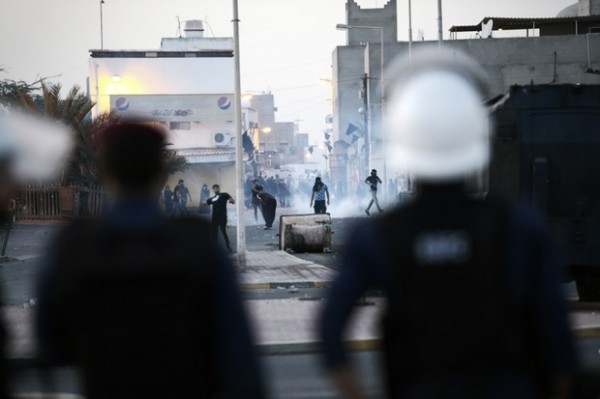Freedom House in Annual “World Freedom” Report: Bahrain One of Middle East’s Most Repressive States

2017-04-29 - 6:39 am
Bahrain Mirror: Freedom House issued its annual report on World Press Freedom, and Bahrain was among the "Not Free" countries, and one of the worst countries on the level of freedom. It also noted that Bahrain "has become one of the Middle East's most repressive states."
Bahrain came in rank 18 from the end of the list; i.e. rank 193 out of 211 countries. Countries like Saudi Arabia, Syria, Sudan, Somalia, Tajikistan, and North Korea fell behind in the list, while Libya and Yemen ranked in better positions than Bahrain.
Bahrain scored 12/100 (0 being the least free) in the Freedom in the World Scores. In the general Freedom Rating it scored 6.5/7 (7 being the least free), while it scored 7/7 on political rights, and 6/7 on civil liberties, with also 7 being the least free.
According to Freedom House, Bahrain remained one of the worst countries, which dramatically declines in score within the past decade.

In the report issued Friday (April 28, 2017), the watchdog stated, "Once a promising model for political reform and democratic transition, Bahrain has become one of the Middle East's most repressive states."
"Since violently crushing a popular pro-democracy protest movement in 2011, the Sunni-led monarchy has systematically eliminated a broad range of political rights and civil liberties, dismantled the political opposition, and cracked down harshly on persistent dissent in the Shiite population," it went on to say.
Freedom House also highlighted the recent developments that took place in Bahrain during 2016.
Among the key developments, it noted:
-
In July, the courts approved a government request to formally disband Al-Wefaq, the country's largest opposition group, which draws its support from the Shiite Muslim majority.
-
The authorities continued to harass and detain leading political and human rights activists, including Nabeel Rajab, Ibrahim Sharif, and Ghada Jamsheer.
-
In June, the government revoked the citizenship of Isa Qassim, the country's most important Shiite cleric, and charged him with money laundering.
-
Regular clashes between police and mostly Shiite protesters occurred throughout the year, and dozens of people were arrested or questioned for participating in a sit-in to show support for Qassim.
In its report's executive summary, Freedom House said that in "In June, a court acting on a motion from the government suspended Al-Wefaq, a largely Shiite group that had long been the kingdom's main opposition political society, and its assets were seized." It added that "a second court ruling formally dissolved Al-Wefaq in July."
"Its leader, Ali Salman, was sentenced by an appellate court in May to nine years in prison on charges including incitement of sectarian hatred," the report further noted.
Furthermore, Freedom House indicated that the Bahraini government "also took aim at the country's highest-ranking Shiite cleric, Isa Qassim. In June, the Interior Ministry announced that Qassim had been stripped of his Bahraini nationality, adding to a growing list of regime critics whose citizenship has been revoked in recent years."
"Authorities claimed that Qassim had incited sectarianism and served foreign interests (...) and money laundering," it went on to say.
The report also noted the Diraz sit-in that was staged as a result of Sheikh Isa Qassim's citizenship revocation, noting, "His supporters gathered outside his home and maintained a vigil through the end of the year to prevent his arrest, at times clashing with police in the area."
In reference to protests, Freedom House highlighted, "Other violent confrontations between protesters and security forces continued in 2016, leading to widespread arrests and a militarized police presence in predominantly Shiite villages and neighborhoods."
On the level of crackdown against activists, the freedom watchdog clarified that the Bahraini authorities "maintained legal pressure on outspoken activists during the year", adding that "Zaynab al-Khawaja was ordered to prison in March to serve a sentence of three years and one month for various convictions related to her criticism of the regime. She was released early in May, partly as a result of pressure from the United States, but she then left the country for Denmark."
"Prominent activists including Nabeel Rajab and Ghada Jamsheer were also imprisoned during the year. Others, including Abdulnabi al-Ekry and the journalist Nazeha Saeed, were forbidden from traveling," Freedom House stated.
The organization said that in 2016, journalists and media entities in Bahrain suffered from the chilling effects of harassment, threats, and attacks, particularly regarding critical coverage of government officials.
In addition, the report indicated that "in July 2016, the minister of information issued strict new guidelines for newspapers' use of internet or social media to disseminate content, further limiting the press's freedom to operate."
- 2024-07-10Bahraini Authorities Summon Head of Sanabis Ma'tam, Threaten "Actions" Due to Mourners' Chants Against Israeli Occupation
- 2024-07-10Political Prisoner Mohammad Al-Raml's Family Say He's Vomiting Blood Due to Poor Conditions, Fear for His Life
- 2024-07-09Ali Al-Majed Arrested After His Return to Bahrain
- 2024-07-08Yusuf Al-Muhafdha: Convicted Returnees to Bahrain Have the Right to a Lawyer, Retrial, and Legal Guarantees
- 2024-07-08Reciter Mahdi Sahwan: Head of Manama Police Informed Me of Ban on Reciters Traveling to Commemorate Ashura